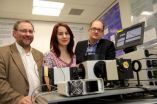(Press-News.org) The positive effects of mindfulness meditation on pain and working memory may result from an improved ability to regulate a crucial brain wave called the alpha rhythm. This rhythm is thought to "turn down the volume" on distracting information, which suggests that a key value of meditation may be helping the brain deal with an often-overstimulating world. Researchers from Massachusetts General Hospital (MGH), Harvard Medical School and the Massachusetts Institute of Technology report that modulation of the alpha rhythm in response to attention-directing cues was faster and significantly more enhanced among study participants who completed an eight-week mindfulness meditation program than in a control group. The report will appear in the journal Brain Research Bulletin and has been released online.
"Mindfulness meditation has been reported to enhance numerous mental abilities, including rapid memory recall," says Catherine Kerr, PhD, of the Martinos Center for Biomedical Imaging at MGH and the Osher Research Center at Harvard Medical School, co-lead author of the report. "Our discovery that mindfulness meditators more quickly adjusted the brain wave that screens out distraction could explain their superior ability to rapidly remember and incorporate new facts."
Brain cells use particular frequencies or waves to regulate the flow of information in much the same way that radio stations broadcast at specific frequencies. One frequency, the alpha rhythm, is particularly active in the cells that process touch, sight and sound in the brain's outmost layer, called the cortex, where it helps to suppress irrelevant or distracting sensations and regulate the flow of sensory information between brain regions.
Previous studies have suggested that attention can be used to regulate the alpha rhythm and, in turn, sensory perception. When an individual anticipates a touch, sight or sound, the focusing of attention toward the expected stimulus induces a lower alpha wave height in cortical cells that would handle the expected sensation, which actually "turns up the volume" of those cells. At the same time the height of the alpha wave in cells that would handle irrelevant or distracting information increases, turning the volume in those regions down. Because mindfulness meditation – in which practitioners direct nonjudgmental attention to their sensations, feelings and state of mind – has been associated with improved performance on attention-based tasks, the research team decided to investigate whether individuals trained in the practice also exhibited enhanced regulation of the timing and intensity of alpha rhythms.
The study tested 12 healthy volunteers with no previous experience in meditation. Half completed the eight-week Mindfulness-Based Stress Reduction Program developed at the University of Massachusetts. The other half were asked not to engage in any type of meditation during the study period. Using magnetoencephalography (MEG), an imaging technique that detects the location of brain activity with extreme precision, the researchers measured participants' alpha rhythms before, during and after the eight-week period. Specifically, they measured alpha rhythms in the brain area that processes signals from the left hand while participants were asked to direct their attention to either their left hand or left foot. Participants' abilities to adjust the alpha rhythm in cortical cells associated with the hand, depending on where their attention was directed, were recorded during the milliseconds immediately after they received an attention cue.
Although all participants had showed some attention-related alpha rhythm changes at the beginning of the study, at the end of the eight weeks, those who completed the mindfulness meditation training made faster and significantly more pronounced attention-based adjustments to the alpha rhythm than the non-meditators did. "This result may explain reports that mindfulness meditation decreases pain perception," says Kerr. "Enhanced ability to turn the alpha rhythm up or down could give practitioners' greater ability to regulate pain sensation."
The study also sheds light on how meditation may affect basic brain function, explains Stephanie Jones, PhD, of the Martinos Center, co-lead author of the paper. "Given what we know about how alpha waves arise from electrical currents in sensory cortical cells, these data suggest that mindfulness meditation practitioners can use the mind to enhance regulation of currents in targeted cortical cells. The implications extend far beyond meditation and give us clues about possible ways to help people better regulate a brain rhythm that is dysregulated in attention-deficit hyperactivity disorder and other conditions." Kerr is an instructor in Medicine and Jones an instructor in Pediatrics at Harvard Medical School (HMS).
INFORMATION:
The senior author of the Brain Research Bulletin report is Christopher Moore, PhD, of Massachusetts Institute of Technology (MIT). Additional co-authors are Qian Wan and Dominique Pritchett of MIT; Anna Wexler, Joel Villaneuva, Jessica Shaw, and Ted Kaptchuk, Osher Research Center at HMS; Sara Lazar, PhD, MGH Psychiatry; Matti Hämäläinen, PhD, Martinos Center for Biomedical Imaging at MGH; Rachel Wasserman, Penn State University; and Ronnie Littenberg, PhD, Women's Mental Health Collective, Cambridge, Mass. The study was supported by grants from the National Institutes of Health and the Osher Research Center at Harvard Medical School.
Massachusetts General Hospital conducts the largest hospital-based research program in the United States, with an annual research budget of nearly $700 million and major research centers in AIDS, cardiovascular research, cancer, computational and integrative biology, cutaneous biology, human genetics, medical imaging, neurodegenerative disorders, reproductive biology, regenerative medicine, reproductive biology, systems biology, transplantation biology and photomedicine.
END
Church attendance in western democracies has declined; yet, a new University of Missouri study shows religious beliefs still influence people at the polls.
Chris Raymond, a graduate instructor of political science in the MU College of Arts and Science, said that many political experts consider voters around the world as "floating without party loyalties," and that religion does not influence voters. Raymond's new study says religion still has a large impact on how people vote and helps define many of the platforms represented in the party system.
In the study, Raymond ...
ANN ARBOR, MICH. -- A Data and Safety Monitoring Committee (DSMC) has determined that patients in a phase III clinical trial given atrasentan in addition to a standard chemotherapy regimen for advanced prostate cancer did not have longer survival or longer progression-free survival than patients on the same chemotherapy regimen who got a placebo rather than atrasentan.
Almost 1,000 patients who had advanced, hormone-refractory prostate cancer were given up to 36 weeks of chemotherapy with docetaxel and prednisone. These patients were randomized so that one half got an ...
Acupuncture provides long-lasting relief to hot flashes, heart palpitations and anxiety due to side effects of the hormone given to counteract testosterone, the hormone that induces prostate cancer, according to a study published in the April issue of the International Journal of Radiation Oncology•Biology•Physics, an official journal of the American Society for Radiation Oncology (ASTRO).
The main treatments for men with metastatic prostate cancer are either surgery or hormone therapy to significantly reduce the level of testosterone in the body. Eliminating testosterone ...
A discovery by Johns Hopkins scientists about how a single-celled fungus survives in low-oxygen settings may someday help humans whose immune systems are compromised by organ transplants or AIDS.
A report on the discovery in a yeast called Schizosaccharomyces pombe appears April 22 in Molecular Cell.
Previous work by the Hopkins team showed that Schizosaccharomyces pombe, a model organism that's often used to study individual genes, contains a protein named Sre1 that allows the organism to adapt to conditions in which oxygen is very low or missing altogether.
To find ...
Berkeley, CA– New research by the U.S. Department of Energy's (DOE) Lawrence Berkeley National Laboratory finds strong evidence that homes with solar photovoltaic (PV) systems sell for a premium over homes without solar systems.
"We find compelling evidence that solar PV systems in California have boosted home sales prices," says the lead author Ben Hoen, a researcher at Berkeley Lab. "These average sales price premiums appear to be comparable with the average investment that homeowners have made to install PV systems in California, and of course homeowners also benefit ...
April 21, 2011 − (BRONX, NY) − Researchers at Albert Einstein College of Medicine of Yeshiva University have for the first time observed the activity of a single gene in living cells. In an unprecedented study, published in the April 22 online edition of Science, Einstein scientists were able to follow, in real time, the process of gene transcription, which occurs when a gene converts its DNA information into molecules of messenger RNA (mRNA) that go on to make the protein coded by the gene.
Robert Singer, Ph.D., co-director of the Gruss Lipper Biophotonics ...
According to a new study, severely obese adolescents are no more likely to be depressed than normal weight peers. The study, which has been released online in the Journal of Adolescent Health, did find that white adolescents may be somewhat more vulnerable to psychological effects of obesity.
This three-year study – performed by researchers from the Center for Child and Adolescent Health Policy at MassGeneral Hospital for Children (MGHfC) and the Department of Public Health and Community Medicine at Tufts Medical School – analyzed the relationship between severe obesity ...
CAMBRIDGE, Mass. -- In the arid Namib Desert on the west coast of Africa, one type of beetle has found a distinctive way of surviving. When the morning fog rolls in, the Stenocara gracilipes species, also known as the Namib Beetle, collects water droplets on its bumpy back, then lets the moisture roll down into its mouth, allowing it to drink in an area devoid of flowing water.
What nature has developed, Shreerang Chhatre wants to refine, to help the world's poor. Chhatre is an engineer and aspiring entrepreneur at MIT who works on fog harvesting, the deployment of devices ...
Scientists at the University of Strathclyde in Glasgow are developing a technique based on a new discovery which could pave the way towards detecting Alzheimer's disease in its earliest stages - and could help to develop urgently-needed treatments.
The technique uses the ratio of detected fluorescence signals to indicate that clusters of peptide associated with the disease are beginning to gather and to have an impact on the brain.
Current techniques are not able to see the peptide joining together until more advanced stages but a research paper from Strathclyde describes ...
A better understanding of corrosion resistance may be possible using a data-mining tool, according to Penn State material scientists. This tool may also aid research in other areas where massive amounts of information exist.
In data mining -- a branch of computer science -- computer programs categorize large amounts of data so they become more useful. Different types of data-mining programs can find correlations between data on specific subjects, or in different areas of a single subject. Data mining finds similarities and differences among data parameters that frequently, ...

